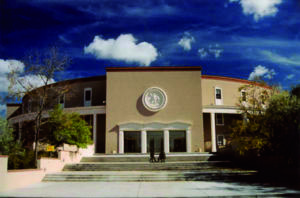The complaint against Dr. Sella was originally filed in 2011 by Operation Rescue (OR) Senior Policy Advisor Cheryl Sullenger, a convicted federal felon who served two years in prison for conspiring to bomb an abortion clinic in 1987. Operation Rescue is a Wichita, Kansas-based anti-abortion organization known for their extreme tactics that often involve harassment and intimidation of doctors and patients.
“This is a familiar tactic Operation Rescue has used in other states,” said ACLU-NM Legal Director Laura Schauer Ives. “When an abortion clinic calls 911, Operation Rescue files a complaint with the state medical board in an attempt to bully and harass doctors. It’s a shame that out-of-state extremists feel that they can abuse and politicize our system of medical oversight to satisfy their political agendas.”
After an anti-abortion radical assassinated Wichita, Kansas physician Dr. George Tiller in 2009, Operation Rescue sent two interns, Bud and Tara Shaver, as “missionaries” to Albuquerque where two of Dr. Tiller’s colleagues had relocated to continue providing abortion care to their patients. Soon after the Shavers began working with local anti-abortion organization Project Defending Life (PDL), they began coordinating with Operation Rescue to file numerous frivolous complaints against abortion providers with the New Mexico State Medical Board.
To date, the medical board has only investigated one complaint filed by OR/PDL, which was cleared by today’s ruling.
“This is really about harassment of doctors and abuse of the medical oversight system,” said ACLU-NM Staff Attorney Alexandra Freedman Smith. “Extremists like Operation Rescue and Project Defending Life aren’t concerned about the health and safety of women; their only goal is to ensure that no New Mexican woman can access a safe and legal abortion.”
New Mexico has experienced an influx of anti-abortion extremism and legislation in recent years, including bills that would criminalize rape victims for seeking abortions, ban abortion after 20 weeks, force a woman to view or listen to an ultrasound before terminating their pregnancy, enforce waiting periods to have an abortion and force young women to notify their parents before seeking abortion care. PDL reports they sought and received a private audience with Governor Susanna Martinez and recently acted as Rep. Nora Espinoza’s “expert witness” in hearings over the forced view/listen ultrasound bill during the current legislative session.
To learn more about Operation Rescue/Project Defending Life’s campaign of harassment against New Mexico doctors, see the Progress Now New Mexico report on OR/PDL methodology, Rhetoric Over Fact: Inside Project Defending Life and Operation Rescue's Exploitation of 911 Calls.
###



